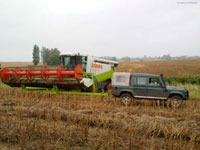Harvest roundup: Friday

A wet week has kept combines in north Scotland under wraps, but a better forecast could allow some progress this weekend.
Richard Stephen still had 60ha (150 acres) of wheat to cut at Muirton of Barra, Oldmeldrum, Aberdeenshire.
“We had a lot of rain yesterday (23 September) – we’re behind with the sowing and it’s too wet to get potatoes as well. The forecast is a bit better now, but it will take a bit of drying up.”
Farmers in the Inverness area had still got about 5% of their winter wheat and spring barley to cut, according to Simon Barry at Highland Grain.
“That hasn’t changed for over a week, because of the wet weather. Unfortunately, the quality is going to be questionable as far as malting is concerned. I would think it will now end up as feed.”
In the Borders, John Jeffrey had still got spring beans to combine at Kersknowe Farm, Kelso, but had finished cereal harvest.
“It’s been an absolute curate’s egg – the winter barley was very poor at 6.4t/ha (2.6t/acre) – the six-row Pelican was awful. But the Pearl all made malting, which just about made up for it.”
Further south, Philip Gorringe had finished harvest at Lower Blakemere Farm, Blakemere, Herefordshire, and was reasonably pleased with yields.
“We finished on Wednesday – and we’re very happy to have done so, given the rain we’ve had over the past two days.”
September was also proving a difficult month for farmers in Co. Down, Northern Ireland, said Graham Furey from Castleview, Killyleagh.
“There is still probably 10-15% of harvest to do in our area. Most of it is spring barley, although there is some late sown winter wheat, too.”
However, cereal quality across Great Britain was above the three-season average so far, according to provisional results from HGCA’s annual Cereals Quality Survey.
As of 17 September, wheat Hagberg Falling Numbers averaged 291 seconds, the highest since 2006.
Protein averaged 12.2%, with specific weights at 77.3kg/hl, the highest since 2003.

